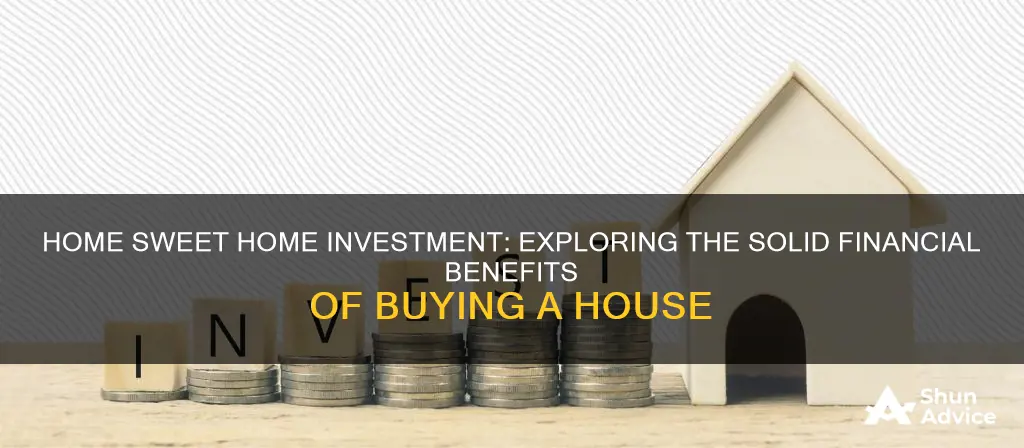
Is buying a house a good investment? Well, it depends. While some people believe that buying a house is a solid investment, others disagree.
Historically, real estate values tend to increase over time, and this is still true today. According to Zillow, the average value of a home in the US has continued to trend up. For example, a home purchased for $250,000 in 2020 would be worth about $350,000 in November 2023. However, this prospect of an increase in value alone is not enough to make a house a true investment.
One of the main reasons why a house may not be considered a good investment is that its primary purpose is to provide the owner with a place to live. Therefore, the owner will have little control over its sale from an investment perspective, as they will likely sell it when it no longer fits their lifestyle, rather than when it is most convenient in terms of a return on investment.
Additionally, there are various carrying costs associated with owning a home, such as monthly mortgage payments, real estate taxes, homeowners insurance, utilities, and maintenance. These costs can add up to thousands of dollars and are not typically incurred when investing in other assets.
On the other hand, buying a house can provide financial benefits such as long-term home and equity appreciation, money savings on rent, and greater financial stability. It can also offer lifestyle benefits, such as more space and the freedom to decorate and make changes to the property.
So, is buying a house a good investment? It depends on various factors, including an individual's financial situation, the location of the property, and the timing of the purchase. While it can be a smart investment for some, it may be a risky one for others.
| Characteristics | Values |
|---|---|
| Primary purpose | To provide a place to live |
| Control over sale | Limited control, as it depends on lifestyle |
| Carrying costs | High |
| Cash flow | No |
| Appreciation | Not guaranteed |
| Tax benefits | Yes |
| Financial stability | Yes |
| Investment type | Long-term |
What You'll Learn
- The primary purpose of a house is to provide shelter, not to be an investment
- A house can only be an investment if you plan to sell it
- The carrying costs of owning a home are too high for it to be an investment
- A house won't generate cash flow unless it's an investment property
- Appreciation is not guaranteed

The primary purpose of a house is to provide shelter, not to be an investment
While buying a house can be a good investment, it is important to remember that the primary purpose of a house is to provide shelter, not to be an investment vehicle.
A house is not a liquid asset, and its primary function is to provide a place to live. This means that you will have little control over its sale from an investment perspective. You will likely sell it when it no longer fits your lifestyle, rather than when it is convenient in terms of maximising returns. This dynamic was evident during the 2008 financial crisis when many people were forced to buy houses at high prices and then sell them at a loss when the market collapsed.
Additionally, the carrying costs of owning a home are high, including mortgage payments, real estate taxes, insurance, utilities, and maintenance. These costs can offset any potential gains from appreciation, and the opportunity cost of investing in a house instead of other assets should be considered.
Furthermore, a house may not always appreciate in value. While real estate values have historically increased over time, there is no guarantee that this will continue indefinitely. The housing market can be volatile, as seen during the 2008 financial crisis, and property values can decrease.
For these reasons, it is essential to view a house primarily as a place of shelter and a long-term commitment rather than a short-term investment.
Investor Numbers: Who's in the Game?
You may want to see also

A house can only be an investment if you plan to sell it
While buying a house can be a good investment, it is important to remember that a house is not an investment in the traditional sense. The primary purpose of a house is to provide shelter, and it is not something that can be easily bought and sold like stocks or mutual funds. Therefore, the only way to profit from a house as an investment is to sell it.
Historically, real estate values tend to increase over time, and this is still true today. According to Zillow, the average value of a home in the US has continued to trend upwards. For example, a home purchased for $250,000 in 2020 would be worth approximately $350,000 in November 2023. However, the prospect of an increase in value alone is not enough to make a house a true investment.
When you buy a house, you will likely sell it when it no longer fits your lifestyle, rather than when it is most convenient in terms of investment returns. This can result in a negative return on investment, as it did for many people during the 2008 financial crisis. They bought houses at high prices when they needed a home for their families, and then some were forced to sell their homes when the market collapsed, resulting in a loss.
If you plan to sell your house to realise the investment gains, you will need to find another place to live. This could mean using some or all of the equity from the sale to fund the purchase of a new home, effectively trapping your equity. To truly profit from the sale, you may need to downgrade to a less expensive house or move to a rental situation.
Additionally, it is important to consider the carrying costs of owning a home, such as monthly mortgage payments, real estate taxes, homeowners insurance, and utilities. These ongoing expenses can offset the potential gains from the sale of the house. Therefore, it is crucial to carefully consider your financial situation and goals before deciding whether to buy a house as an investment.
Maximizing Military Retirement Pay: Strategic Investment Options
You may want to see also

The carrying costs of owning a home are too high for it to be an investment
The carrying costs of owning a home are too high for it to be considered an investment. When you purchase an investment, you typically don't need to put more money into it for it to make a profit. However, when you own a home, you have to make monthly mortgage payments, pay real estate taxes, homeowners' insurance, private mortgage insurance, and utilities. These are known as carrying costs or holding costs.
In addition to the regular carrying costs, houses need maintenance and repairs over time. This can include replacing the roof, siding, windows and doors, carpets and flooring, and driveway. You may also engage in major remodelling, such as replacing kitchens and bathrooms. Each of these expenses can cost thousands of dollars.
True investments don't require this kind of ongoing cash outlay. While you can rationalise these expenses based on the fact that the house is providing you with shelter, it's important to remember that if your house is your shelter, it's not really an investment.
For example, let's say you purchase a house for $200,000 and sell it 10 years later for $300,000. This may seem like a good investment at first glance. However, when you take into account the carrying costs and other expenses over those 10 years, the profit margin decreases significantly. If the house cost you $1,000 per month for principal, interest, taxes, and insurance (PITI), plus $300 per month for utilities, you would have spent $15,600 per year, or $156,000 over the decade. With additional costs for repairs and maintenance, the total expenses can easily exceed the profit made from the sale of the house.
Therefore, when considering buying a house as an investment, it's important to factor in the carrying costs and other expenses to get a more accurate picture of the potential profit or loss.
Jesus Invested in People Through Love and Sacrifice
You may want to see also

A house won't generate cash flow unless it's an investment property
While buying a house is often thought of as an investment, it is not always a good one. There are several reasons for this, one being that a house will not generate cash flow unless it is an investment property.
When you buy a house to live in, it is not a liquid asset. You can't sell half of it to free up cash, and if you need to liquidate immediately, you may need to sell it at a discount. In addition, the carrying costs of owning a home are too high for it to be considered an investment. You have to make monthly mortgage payments, pay real estate taxes, homeowners insurance, and utilities. There are also maintenance and repair costs to consider, such as replacing the roof, siding, windows, and doors, which can cost thousands of dollars. These are known as the "carrying costs" of homeownership, and true investments don't require this kind of ongoing cash outlay.
On the other hand, if you own an investment property and rent it out, you can generate cash flow. This can be done by renting out a room, a unit in a multi-family home, or the whole house. This rental income can help pay the mortgage, insurance, and other costs associated with homeownership, and in the best-case scenario, it can even provide cash flow to the owner.
However, buying and managing real estate investments can be lucrative but comes with a lot of work, money, and risk. It is important to consider all the costs and risks associated with owning an investment property, such as high turnover or unexpected maintenance issues.
In conclusion, while a house may appreciate in value over time, it will not generate cash flow unless it is an investment property that is rented out. This is something to consider when deciding whether or not to buy a house as an investment.
Stash Investing: Millions of Users
You may want to see also

Appreciation is not guaranteed
The possibility of a flat or declining housing market cannot be discounted. Should this happen, you may be forced to live in your house much longer than you expected, and you may find that you cannot sell the property or borrow against the equity.
The appreciation of a house is influenced by many factors, some of which are within the control of the homeowner and some of which are not. Broader economic trends are entirely out of the homeowner's control and can influence home appreciation. For example, the COVID-19 pandemic caused a drop in the national average appreciation rate.
Factors that can influence home appreciation include housing supply and demand, the local and national economy, and mortgage interest rates. A higher supply of houses creates a buyer's market, where there is a lack of demand, and homes tend not to appreciate or appreciate more slowly. In contrast, a lower supply of houses creates a seller's market, where increased competition leads to higher home values.
Location is also a critical factor in home appreciation. Properties in areas with successful companies, high-paying jobs, excellent schools, and world-class entertainment and restaurants tend to appreciate more. Conversely, homes in areas with fewer amenities and opportunities may not appreciate as much due to lower demand.
While it is true that homeowners can attempt to increase their property's value through renovations and improvements, this is not always effective. For example, adding a pool may increase a property's value in Florida or California but probably would not make much difference in Minnesota. Additionally, forced appreciation through methods such as raising rent or decreasing property expenses can be challenging and time-consuming.
Will Buchanan: Navigating the Investment Landscape
You may want to see also
Frequently asked questions
It can be, but it's not always the case. Historically, real estate values tend to increase over time, but there are several other factors to consider, such as the location of the property, your financial situation, and the timing of your purchase.
There are several benefits to buying a house, including long-term home and equity appreciation, money savings on rent, and greater financial stability. Owning a house can also provide a sense of security and control over your living space.
Some risks associated with buying a house include high upfront and maintenance costs, possible depreciation, and difficulties in timing the market correctly. It's also important to remember that your money could be invested in other ways that may offer higher returns.







